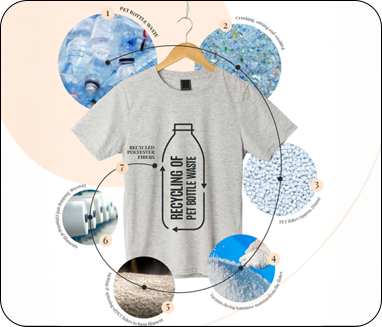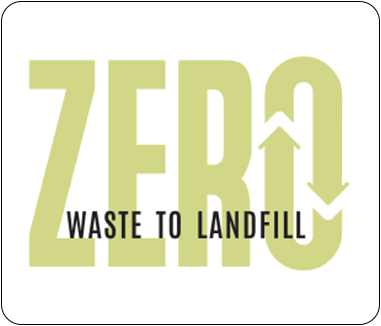

We’re powering a cleaner future by transitioning to renewable energy across our operations. From solar rooftops and biomass briquettes to energy-efficient technologies, we’re making sustainability our default setting.
Today, 68% of the energy used across ABLBL-owned facilities comes from renewable sources—marking a major step toward decarbonizing our business.
We embed circularity into every stage of the product lifecycle—from thoughtful design and responsible production to reuse and end-of-life solutions. Our approach begins with creating garments built to last.
Key Initiatives:
Partnering with GIZ: In collaboration with GIZ under the develoPPP programme, we’re working to strengthen textile circularity in India. The project focuses on material innovation, eliminating harmful substances, advancing closed-loop recycling, and developing traceable, plastic-free alternatives.
Take-Back Programmes: Through Peter England and American Eagle, we’ve launched take-back programmes across 361 stores, enabling customers to return used garments. These are then repurposed or donated to NGOs—extending product life and reducing landfill waste.


We treat waste as a resource and a key enabler of circularity. Rooted in the principles of designing out waste, keeping materials in use, and regenerating natural systems, our approach focuses on strengthening segregation, encouraging responsible disposal, and partnering with authorized vendors for hazardous waste management.
We achieved our ‘Zero Waste to Landfill’ goal by diverting waste through recycling, reuse, and upcycling initiatives across our facilities.
Fashion Craft Ltd., our Bengaluru unit, became our first industrial manufacturing facility to receive the TRUE Zero Waste Gold certification by GBCI. Haritha Apparels Ltd. joined this milestone in 2024, reaffirming our leadership in sustainable waste management.
At ABLBL, sustainability is built into our spaces—literally. Our green building strategy focuses on resource-efficient designs, low-carbon materials, and healthier spaces for people and the planet.
Today, over 13.4 lakh sq. ft. of our built environment is Green Building Certified, a testament to our commitment to future-ready, high-performance infrastructure.
Our climate strategy is bold, science-backed, and aligned with the Paris Agreement and India’s Net Zero ambition.
Validated by SBTi, we’ve committed to reduce absolute Scope 1 & 2 emissions by 54.6% and Scope 3 emissions by 32.5% by FY2033 (vs FY2023 baseline).
We are driving this transformation with urgency—across operations, supply chains, and beyond.
With ever-increasing stress on water reserves, we have identified responsible water management as a critical area with a focus on reducing freshwater withdrawal by Increasing rainwater collection capacity and Enhancing recycling & reusing the treated wastewater.
Through conservation, reuse, and source rejuvenation, we have achieved a key milestone: becoming Water Positive at an organizational level. Our integrated approach ensures we not only use water wisely but also give back more than we consume.
We sourced 55% of our water needs from renewable sources like rainwater harvesting and reused 78% of treated wastewater within our facilities. These efforts reflect our commitment to building a future where water is respected, preserved, and restored.
We continuously strive to improve our existing systems and processes. Being a leader in the apparel retail sector, we have made a commitment to use 100% sustainable packaging material by 2025.
Our packaging strategy takes into consideration design optimisation, reduction, recycling and innovative means of packaging. We started measuring packaging consumption in 2013 and have been taking the necessary steps to reduce pollutant content. ABLBL has moved away from plastic bags and ships all products in either paper bags or corrugated boxes, which is also more customer-friendly.
Some of the initiatives are:
Compostable Polybags: We were able to identify some innovative packaging solutions and decided to implement compostable polybags as a substitute for HDPE/PP Polybags.
This initiative has proven effective in reducing ABLBL’s carbon footprint and promoting a cleaner environment.
One Garment, One Tag: To reduce the number of tags a new integrated tag was introduced. This is designed in such a way that it covers all the information such as a barcode, branding, special feature, storyline, etc.
Plastic-free packaging in Louis Philippe Green Crest: We were able to develop a new-collar support which is made of 100% recycled paper board. This helps to eliminate the plastic collar traveller and butterfly and makes the LP crest product line completely plastic free and more sustainable.
Extended Producer Responsibility (EPR): EPR is an environmental protection strategy that makes the manufacturer, brand owners and producers responsible for recycling and final disposal of plastic packaging material. EPR also encourages brand owners to gradually decrease the plastic they introduce in the market and adopt alternate non-polluting packaging.
At ABLBL, all our plastic packaging materials are single-layered plastic and recyclable in nature. To ensure 100% recyclability, we are proactively working towards the Extended Producer Responsibility (EPR) commitment to ensure that nothing goes to landfill.
ABLBL is committed to making sustainable products that have a positive impact on the environment, community and the planet.
We have developed an internal framework for sustainable attributes which are: Sustainable Raw Materials, Production Processes, Manufacturing Facilities, Sustainable Packaging and Sustainable Livelihood. The product sustainability attributes are measured half-yearly and annually.
Some of the initiatives undertaken:
Sustainable Raw Material: We realise that to create sustainable products, it is essential to integrate sustainable raw materials and responsible sourcing into the product life cycle. To identify the most sustainable materials, we refer to the Higg Material Sustainability Index (Higg MSI) and various other international standards.
We strive to source more sustainable materials and manufacture at factories that ensure environmental and social responsibility while maintaining optimal cost and the highest standards of quality. At ABLBL, we use various sustainable raw materials such as BCI Cotton, Liva Eco, FSC certified Birla Modal, Recycled Cotton and Recycled Polyester etc. and its blends.
A few examples of sustainable products are:
Van Heusen Move Labs Collection: Van Heusen’s Move Labs Collection is a versatile range of shirts, trousers, suits, and blazers, tailored to the modern man who values both fashion and functionality
Louis Philippe Jeans Green Crest: Louis Philippe has introduced Green Crest denims, which are a perfect accompaniment for any occasion. These denims are crafted using sustainable fabric, providing unmatched comfort and stretchability. PULCRA fabric, which is made from recycled cotton and requires less water during the dyeing process, is utilised in this collection. As a result, the carbon footprint is also minimised. The manufacturing process for this product utilises an eco-friendly laser dry process, which eliminates the need for hazardous manual labour. Additionally, the chemicals used in this product have zero harmful effects on the ecosystem.
Lifecycle Assessment
We see LCA as a lens to assess Business and Supply Chain Sustainability. We strive to provide our customers with products that have enhanced environmental and social sustainability performance and pose minimal health risks. Through Lifecycle Assessments (LCA) utilising a Cradle-to Grave approach, we identify potential risks and opportunities to reduce material and resource consumption.
ABLBL has implemented various process efficiencies to minimise environmental impacts, and we continue to strive for resource efficiency. Additionally, we have integrated eco-design and decision-making into our LCA approach.
At ABLBL, sustainability is woven into every link of our supply chain. We believe that strong supplier partnerships are the key to delivering long-term, positive impact. Through collaboration, shared responsibility, and continuous improvement, we are raising the bar on ethical, environmental, and social performance.
Our commitment goes beyond responsible sourcing—we actively work to ensure fair treatment, safe working conditions, and sustainable practices across our value chain.
Here’s how we’re making it happen:
1. Supplier Sustainability Assessment
We carefully select suppliers based on quality, cost, delivery, and sustainability performance. Our in-depth assessments cover environmental impact, social responsibility, and ethical practices. Beyond evaluation, we actively support our suppliers in adopting renewable energy, rainwater harvesting, Zero Liquid Discharge systems, and chemical management—driving real change on the ground.
2. Supplier Sustainability Index (SSI)
To bring structure and transparency to supplier performance, we’ve developed the Supplier Sustainability Index—a proprietary ESG scoring framework. Suppliers are rated Platinum to Bronze based on their Quality, Social, and Environmental performance. This index helps us benchmark progress, reward leaders, and identify improvement areas across critical Tier-1 and Tier-2 suppliers.
3. Higg Index Adoption
As a long-time and first key partner of the Sustainable Apparel Coalition (SAC), ABLBL is among the early adopters of the Higg Index. We’ve successfully conducted and verified FEM and FSLM self-assessments across all nine in-house facilities—strengthening our visibility and accountability across the value chain.
4. Vendor Code of Conduct
Our Vendor Code of Conduct is a cornerstone of ethical sourcing. Aligned with ILO conventions, SA 8000, WRAP, and the Indian Factories Act, this Human Rights Due Diligence program ensures compliance with key principles like fair wages, safe workplaces, and legal adherence. Today, over 98% of our vendors are covered under the programme, with many progressing from non-compliant to fully compliant status—thanks to ongoing training and audits.
5. Chemical Management System
Since 2016, we’ve transformed how chemicals are managed in our supply chain. We’ve implemented strict guidelines, MRSL & RSL lists, and wastewater protocols—ensuring safer inputs and reduced chemical usage. As a ZDHC-approved vendor, we’ve onboarded 15 Tier-1 laundry units to the ZDHC Gateway, enabling real-time monitoring of chemical and wastewater compliance. Training for suppliers, brands, and sourcing teams has further amplified impact.
In a rapidly changing and ever-evolving business landscape, it is impossible to flourish without continuous updating of knowledge and skills. In this regard, we at ABLBL focus in our people’s development in both behavioural and functional learning, enabling us to develop future-ready leaders. The learning of employees is anchored by our internal capability-building academy, ABLBL University as well as Gyanodaya, the Aditya Birla Group Global Centre for Leadership.
One of our priorities at ABLBL has been the effective harnessing of our leadership and people’s capabilities through focused initiatives toward talent development. . The initiatives enable our employees to focus on the achievement of personal and professional goals while in alignment with the organisational strategy and their own career aspirations.
We are proud to be represented by women across levels, comprising 54% of our overall workforce. We also have a healthy mix of multigenerational employees with over 48% of our employees under the age of 30.
Employee Wellness has always been one of the priority areas in enriching life and strengthening the Employee Value Proposition at ABLBL. With the pandemic and its ramifications still looming, this has become an even bigger priority for us.
ABLBL’s vision is to create a fulfilling and caring workplace, where employees are valued and supported both as individuals and as employees. It is committed to providing facilities to support employees with work-life challenges while enjoying a fulfilling career. Its initiatives including leave policies, flexible work arrangements, and employee wellness programs aim to help employees maintain a healthy work- life balance.
At ABLBL, we believe that only people who are engaged and involved with a company’s purpose can build an organisation of this magnitude, collectively. Through our engagement programmes, we encourage a sense of belonging and ownership among employees, resulting in workplace satisfaction, retention and enhanced productivity.
ABLBL has implemented enhanced safety measures to protect employees in the workplace. We introduced comprehensive health and wellness programmes for employees and engaged with them on safety through training and initiatives, fostering a safer and healthier workplace environment.




